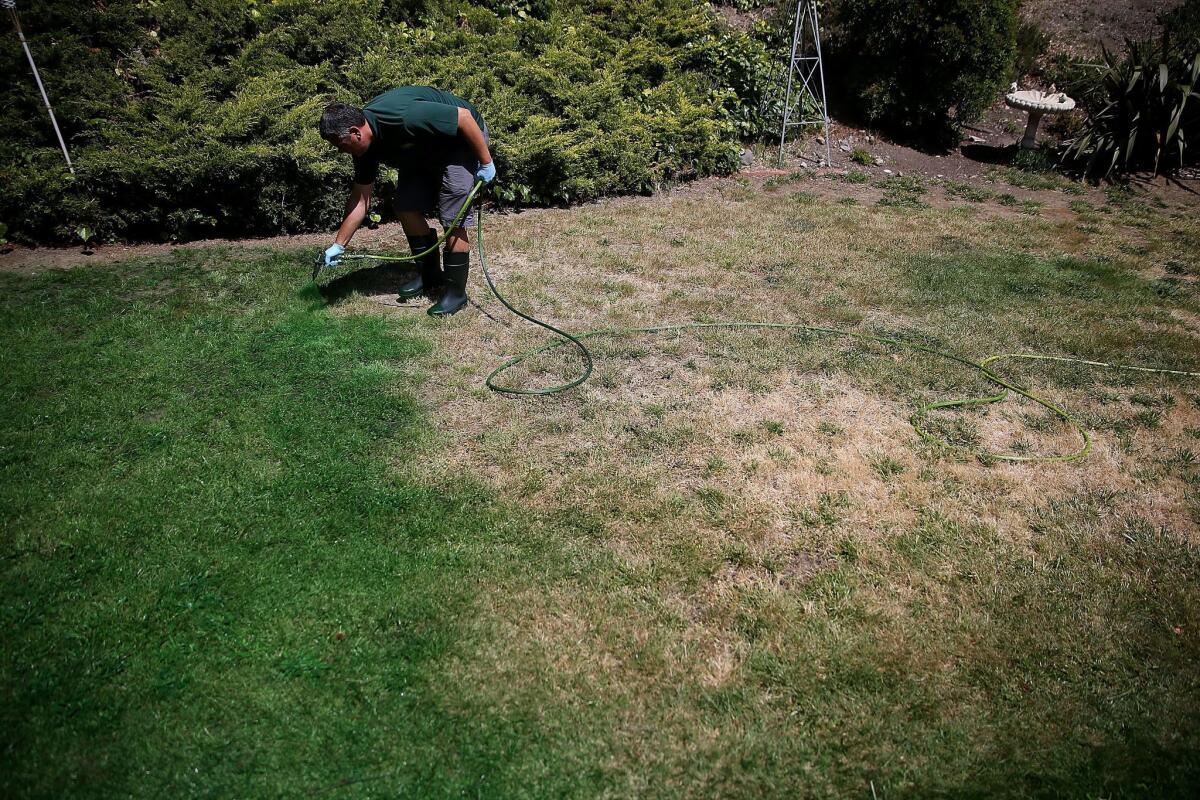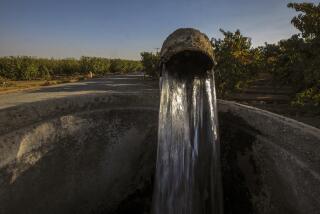Op-Ed: Dianne Feinstein: How DC can help fight the drought in California

Brown Lawns Green owner Bill Schaffer applies green paint to a lawn on May 29 in Novato, Calif. As the severe California drought continues to worsen, homeowners and businesses looking to conserve water are letting lawns go dormant and some are having them painted to look green.
Last year, California voters overwhelmingly approved a $7.5-billion bond to upgrade the state’s water infrastructure. This investment will help combat the effects of climate change, which is only worsening the drought we face now.
But the state can’t stand on its own. The tremendous challenge of upgrading our water infrastructure will require federal cooperation. That’s why I plan to introduce drought legislation soon to lay out the federal role in this long-term effort.
For much of the last year I’ve been working on a limited drought bill that concentrated on operating the federal and state water projects more efficiently while remaining consistent with environmental laws. Those steps will be a significant part of the legislation I propose. However, aligning federal policy with the state bond is crucial, and that means expanding the effort to include long-term solutions such as storage, desalination and recycling.
The federal government can and must play a significant role in proposals for new and expanded reservoirs to store water north and south of the Sacramento-San Joaquin delta. Most of the environmental studies necessary to evaluate these projects have been languishing for a decade or more, and they must be completed as quickly as possible.
Expanding these storage facilities will benefit not only urban areas, rural communities and farms, but also fish species that depend on the cold-water supplies held in reservoirs. In addition to expediting the federal environmental studies, there’s also a role for federal dollars to leverage state investments.
Water recycling and desalination are two other key strategies that we must pursue. They will help urban communities become more self-reliant.
For example, the Orange County Water District will soon complete an expansion of its water reuse facility to provide more than 100,000 acre-feet of water each year. Farther south, Poseidon’s $1-billion Carlsbad desalination plant will soon generate enough water to supply 300,000 San Diego County residents.
The federal government has a role to play in supporting research on these technologies — including improving the efficiency of membranes used to filter seawater, recapturing energy used in the process and developing strategies to minimize environmental effects — as well as investing in targeted projects to partner in these efforts.
In addition to these long-term efforts, the bill I’m developing would help get more water to urban and rural areas where the drought is taking the highest toll. I’ve worked closely with federal and state agencies to develop these provisions in a way that reflects existing flexibility within the Endangered Species Act and applicable biological opinions. The bill will clarify how agencies can adjust water deliveries in a drought without violating existing standards that protect fish populations.
Critics suggest that such flexibility would help only large farms. That is false.
Moving more water through the Central Valley Project and State Water Project will help supply water to millions of Californians in urban areas, including Silicon Valley and Southern California. It will also increase water allocations for small family farms in the San Joaquin Valley. For example, more than 15,000 small farms served by the Friant Water Authority — with an average size of just 83 acres — would benefit.
California agriculture is a $50-billion industry that employs 3 million people. Our state is an integral part of the nation’s food supply. It’s vital that we help keep it running, not just for California but for the country.
The ability to move more water also has a significant environmental benefit in improving supplies for Central Valley wildlife refuges and migratory bird habitat.
Finally, the comprehensive water bill I’m working on will bolster populations of threatened and endangered fish and migratory birds, which is not only important to their survival but can also help prevent pumping restrictions that reduce deliveries to communities and farms. California has the lead on many long-term habitat improvement projects for these species, but federal agencies can take steps now to jump-start restoration efforts.
For example, federal agencies can work with local water districts on the Stanislaus River to investigate ways to limit the populations of predator fish, which consume large numbers of salmon smolts.
Agencies can also study measures that help fish populations recover, such as barging salmon smolts through the delta to boost their low survival rates as they migrate to the ocean. And federal efforts can assist the state on near-term habitat projects such as creating gravel bars for fish and infrastructure to convey water to wildlife refuges to benefit migratory birds.
Water policy has a long, divisive history in California and the West. Creating comprehensive legislation that bridges those divides is not easy. That’s why I am getting input from Democrats and Republicans, farmers and environmentalists, city leaders and wildlife managers, and from citizens up and down the state.
I’m also committed to following regular order, which means that after the bill is introduced I will seek a public hearing and members of Congress and Californians can evaluate it and weigh in on its contents.
My goal remains constant: to draft a bill that benefits all of California. The drought and our changing water future affect us all, and we must come together and work toward a positive solution.
Dianne Feinstein is the senior U.S. senator from California.
Follow the Opinion section on Twitter @latimesopinion and Facebook
More to Read
A cure for the common opinion
Get thought-provoking perspectives with our weekly newsletter.
You may occasionally receive promotional content from the Los Angeles Times.










